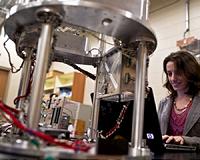 |
Washington DC (SPX) Mar 01, 2011 Three scientists, including a former NASA executive, will become some of the first scientists to fly on a commercial spacecraft - and they will fly multiple times - under the terms of two funded agreements announced between the nonprofit Southwest Research Institute and two commercial spacecraft providers, Virgin Galactic and XCOR Aerospace. The Southwest Research Institute (SwRI), a nonprofit research institute with annual revenue exceeding $500 million, will purchase a total of 8 to 17 scientific research flights on two vehicles - Virgin Galactic's SpaceShipTwo and XCOR Aerospace's Lynx Mark I - to fly both scientists and scientific payloads to the upper atmosphere and space. The scientists selected for the flights are Dr. Alan Stern, Dr. Dan Durda, and Dr. Cathy Olkin, and the science payloads will include biomedical, microgravity science, and astronomical imaging projects. All three scientists selected have trained for suborbital spaceflight aboard zero-G aircraft, in NASTAR centrifuges and aboard Starfighter F-104 jet fighters in the last year. Dr. Stern, the former head of the Science Mission Directorate at NASA, stated, "We at SwRI are very strong believers in the transformational power of commercial, next-generation suborbital vehicles to advance many kinds of research. We also believe that by putting scientists in space with their experiments, researchers can achieve better results at lower costs and a higher probability of success than with many old-style automated experiments." George Whitesides, President and CEO of Virgin Galactic said, "This agreement signals the enormous scientific potential of the Virgin spaceflight system. Virgin Galactic will be able to offer researchers flights to space that are unprecedented in frequency and cost. Science flights will be an important growth area for the company in the years to come, building on the strong commercial success already demonstrated by deposits received from over 400 individuals for Virgin's space experience." XCOR Aerospace's COO, Andrew Nelson, stated, "When someone issues a commercial contract with their own money, this means something," and XCOR's chief executive officer, Jeff Greason, added, "I look forward to the pioneering work this partnership will achieve." Commercial Spaceflight Federation Executive Director John Gedmark added, "This is a historic moment for spaceflight - a scientific research institution is spending its own money to send its scientists to space. I expect that these scientists will be the first of many to fly to space commercially. As the scientific community realizes that they can put payloads and people into space at unprecedented low costs, the floodgates will open even wider." Dr. Dan Durda, one of the Southwest Research Institute scientists selected to fly, said, "We're another step closer to the era of routine 'field work' in space research. More and more researchers will soon fly with their own experiments in space, and do it regularly enough to allow the important advances that come with iterative investigations. I'm looking forward to that future and helping it become a reality." The announcements come as more than 300 scientists, educators, engineers, and students are registered to attend the Next-Generation Suborbital Researchers Conference which began today in Orlando, Florida at the University of Central Florida, to discuss the topic of scientific applications of commercial suborbital spacecraft. The conference runs through March 2nd.
Share This Article With Planet Earth
Related Links Commercial Spaceflight Federation Space Tourism, Space Transport and Space Exploration News
 Aspiring Students Shoot For The Stars
Aspiring Students Shoot For The StarsOrlando FL (SPX) Mar 01, 2011 Three University of Central Florida undergraduate students are getting the opportunity of a lifetime - building an experiment that is scheduled to launch into space in late 2011 or 2012. "It was a bit intimidating at first," said Josh Steele, a computer engineering major from Jensen Beach, who's building an experiment that will help test theories about how planets form. "In the class ... read more |
|
| The content herein, unless otherwise known to be public domain, are Copyright 1995-2010 - SpaceDaily. AFP and UPI Wire Stories are copyright Agence France-Presse and United Press International. ESA Portal Reports are copyright European Space Agency. All NASA sourced material is public domain. Additional copyrights may apply in whole or part to other bona fide parties. Advertising does not imply endorsement,agreement or approval of any opinions, statements or information provided by SpaceDaily on any Web page published or hosted by SpaceDaily. Privacy Statement |